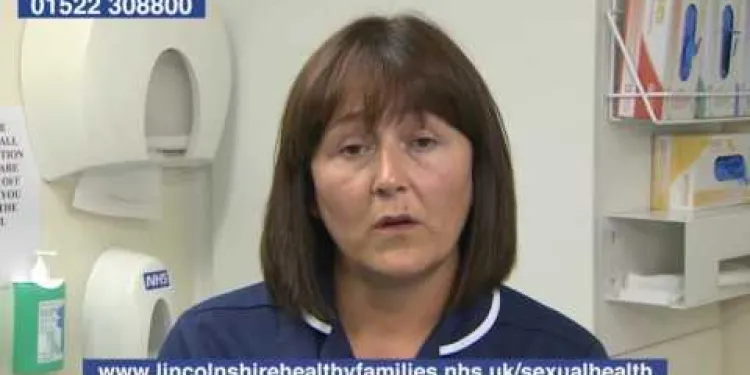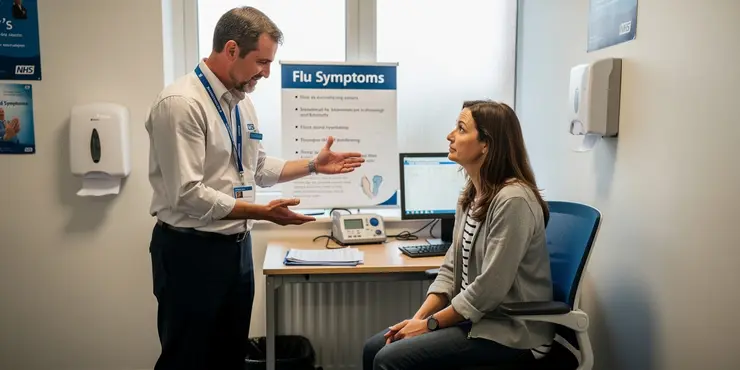Find Help
More Items From Ergsy search
-

Causes of a sore throat
Relevance: 100%
-

Treating a sore throat
Relevance: 100%
-

Sore throat: what should I do?
Relevance: 95%
-

What is the best way to treat a sore throat from a cold?
Relevance: 82%
-

What are the symptoms of a cold sore?
Relevance: 51%
-

What are Cold Sores?
Relevance: 47%
-

Is there a cure for cold sores?
Relevance: 47%
-

Are cold sores contagious?
Relevance: 47%
-

What causes cold sores?
Relevance: 45%
-

How are cold sores transmitted?
Relevance: 45%
-

How long do cold sores last?
Relevance: 43%
-

What triggers a cold sore outbreak?
Relevance: 43%
-

How can I prevent cold sores?
Relevance: 43%
-

Honey 'as good as antiviral creams' for cold sores | NHS Behind the Headlines
Relevance: 37%
-

What are the common symptoms of a cold?
Relevance: 29%
-

Can gonorrhoea infect areas other than the genital organs?
Relevance: 28%
-

How to Treat a Common Cold
Relevance: 27%
-

The symptoms of gonorrhoea
Relevance: 26%
-

What are the symptoms of flu ?
Relevance: 26%
-

Dealing with Common Childhood Illnesses
Relevance: 25%
-

What are the common symptoms of hay fever?
Relevance: 25%
-

How to treat a cold | NHS
Relevance: 25%
-

What are the symptoms of Rubella?
Relevance: 24%
-

What are the symptoms of H3N2 flu?
Relevance: 23%
-

How can I treat a cold at home?
Relevance: 23%
-

Can I use a humidifier to help with my cold symptoms?
Relevance: 23%
-

How to treat glandular fever | NHS
Relevance: 23%
-

What are the symptoms of Super Flu?
Relevance: 22%
-

What are the symptoms of Nipah Virus infection?
Relevance: 21%
-

How to treat tonsillitis | NHS
Relevance: 21%
-

Head and Neck Cancer Diagnosis
Relevance: 21%
-

Help with tonsillitis
Relevance: 20%
-

How long does a common cold typically last?
Relevance: 20%
-

Group A strep: North East GP tells you what you need to know
Relevance: 19%
-

Is there a way to cure a cold quickly?
Relevance: 19%
-

Is taking antibiotics always bad?
Relevance: 18%
-

What are the symptoms of measles?
Relevance: 18%
-

Should I see a doctor for a cold?
Relevance: 17%
-

Can impetigo spread to other parts of my body?
Relevance: 17%
-

What are common symptoms of sleep apnea?
Relevance: 17%
Treating a Sore Throat
Understanding a Sore Throat
A sore throat is a common ailment that usually signifies an underlying infection or irritation. The condition is typically marked by pain, scratchiness, or irritation of the throat that often worsens when swallowing. In the UK, sore throats can be caused by viral infections such as the common cold or flu, bacterial infections like streptococcus (strep throat), allergies, or dry air. Understanding the underlying cause is key to choosing the appropriate treatment.
Home Remedies
Several home remedies can alleviate the discomfort of a sore throat. These include:
- Hydration: Drink plenty of fluids to keep the throat moist and well-lubricated. Warm teas, broths, and water with honey can be particularly soothing.
- Saltwater Gargle: Dissolve half a teaspoon of salt in a glass of warm water and gargle several times a day to reduce swelling and soothe the throat.
- Humidifier: Using a humidifier can add moisture to the air, easing throat irritation from dry air.
- Rest: Give your voice a break and get plenty of sleep to support your body’s immune response.
Over-the-Counter Medications
If home remedies are not enough, several over-the-counter (OTC) medications available in the UK can help alleviate symptoms:
- Pain Relievers: Paracetamol (acetaminophen) or ibuprofen can reduce pain and fever associated with a sore throat.
- Throat Lozenges: These can be effective in providing temporary relief by soothing irritated tissues in the throat.
- Sprays: Anaesthetic throat sprays can numb the throat and reduce pain.
When to Seek Medical Attention
Most sore throats improve within a week without medical intervention. However, visit your General Practitioner (GP) if you experience:
- Severe pain or difficulty swallowing
- High fever or chills
- Persistent symptoms lasting more than a week
- Pus or white patches on your tonsils
- Enlarged glands in your neck
Such symptoms may indicate a bacterial infection requiring antibiotics or other specific treatments.
Conclusion
A combination of home remedies, OTC medications, and proper hydration can effectively manage most sore throats. It is essential to monitor your symptoms and consult a healthcare professional if your condition does not improve or worsens, ensuring timely treatment for more serious infections. Staying informed and prepared helps in managing discomfort and promoting faster recovery.
Treating a Sore Throat
Understanding a Sore Throat
A sore throat happens when your throat hurts. It can feel scratchy and it might hurt more when you swallow. In the UK, common causes of a sore throat include having a cold or flu, a throat infection, allergies, or dry air. Knowing why your throat hurts can help you choose the right way to feel better.
Home Remedies
There are simple things you can try at home to feel better:
- Drink Lots: Have lots of drinks to keep your throat wet. Warm drinks like tea, broths, or water with honey help make your throat feel better.
- Saltwater Gargle: Mix a little salt with warm water. Gargle it and spit it out a few times each day.
- Use a Humidifier: This puts moisture in the air. It helps if the air in your home is too dry.
- Rest: Rest your voice and get plenty of sleep. This helps your body fight off the illness.
Over-the-Counter Medications
If home tips are not enough, you can try some medicines you buy from a pharmacy:
- Pain Pills: Tablets like paracetamol or ibuprofen can help reduce pain and fever.
- Throat Sweets: These can help make your throat feel better for a little while.
- Throat Sprays: These sprays can numb your throat and ease the pain.
When to See a Doctor
Most sore throats get better in a week. See your doctor if you notice:
- Very bad pain or trouble swallowing
- A high fever or feeling very cold
- Symptoms last more than a week
- White spots in your throat
- Big lumps on your neck
These could mean you have a bacterial infection and might need more help.
Conclusion
You can often manage a sore throat with home tips, medicines, and by drinking plenty of fluids. Keep an eye on your symptoms and talk to a doctor if you do not get better. Being careful and watching what happens will help you feel better sooner.
Frequently Asked Questions
What are common causes of a sore throat?
Common causes include viral infections (such as colds and flu), bacterial infections (like streptococcus), allergies, dry air, pollution, smoking and yelling or talking loudly.
When should I see a doctor for a sore throat?
You should see a doctor if your sore throat is severe, lasts more than a week, is accompanied by high fever, trouble breathing, difficulty swallowing, or if you notice a rash or have blood in your saliva or phlegm.
Are there any over-the-counter medications to help with a sore throat?
Yes, throat lozenges, antiseptic sprays, and pain relief medications such as paracetamol or ibuprofen can help alleviate symptoms.
Can home remedies help with a sore throat?
Yes, home remedies like saltwater gargles, honey and lemon tea, staying hydrated, using a humidifier, and throat lozenges can provide relief.
Is warm or cold beverage better for a sore throat?
Warm beverages, such as warm water with honey and lemon, herbal teas, or soups, are often soothing for a sore throat. However, some people find cold beverages or ice lollies help numb the throat and reduce pain.
Can a sore throat be a symptom of COVID-19?
Yes, a sore throat can be a symptom of COVID-19, along with fever, cough, loss of taste or smell, and other symptoms. If you suspect you have COVID-19, you should follow NHS guidelines and get tested.
What are the best ways to prevent a sore throat?
Good hygiene practices, such as washing hands regularly, avoiding close contact with sick individuals, not smoking, staying hydrated, and using a humidifier, can help prevent sore throats.
Can allergies cause a sore throat?
Yes, allergies to pollen, dust, mould, and pet dander can cause postnasal drip, which may lead to a sore throat.
How can I tell if my sore throat is viral or bacterial?
Viral sore throats often come with cold symptoms like a runny nose and cough, while bacterial sore throats, such as strep throat, might have more localized symptoms like severe throat pain without the accompanying cold symptoms. A doctor can perform tests to determine the cause.
Is gargling with salt water effective for a sore throat?
Yes, gargling with warm salt water can help to reduce swelling and soothe a sore throat. Mix about half a teaspoon of salt in a glass of warm water and gargle several times a day.
Can dairy products worsen a sore throat?
While dairy products themselves don’t worsen a sore throat, they can thicken mucus, which may feel uncomfortable. However, some people find cold dairy products like ice cream soothing.
Is honey effective for treating a sore throat?
Yes, honey has antibacterial properties and can help soothe a sore throat. It can be added to warm water or tea.
Are there certain foods I should avoid with a sore throat?
Avoid rough, scratchy, or acidic foods as they might irritate your throat. Stick to soothing, easy-to-swallow foods like soups, broths, and soft fruits and vegetables.
Is it safe to exercise with a sore throat?
If your symptoms are mild and you don’t have a fever, light exercise might be okay, but it's advisable to rest. If you have more severe symptoms or a fever, it's best to avoid exercise.
Do I need antibiotics for a sore throat?
Antibiotics are not effective against viral infections, which are the most common cause of sore throats. They are only prescribed for bacterial infections, such as strep throat, confirmed by a doctor.
Why does my throat hurt?
A sore throat can happen for a few reasons. Here are some common ones:
- A cold or the flu. These are bugs that make you sick.
- Allergies. Things like pollen or dust can bother your throat.
- Dry air. When the air is very dry, it can make your throat feel scratchy.
- Smoking. Cigarette smoke can hurt your throat.
- Shouting or talking loudly for a long time. This can strain your throat.
If your throat hurts a lot, you can try these things to feel better:
- Drink warm drinks like tea with honey.
- Use a humidifier to make the air less dry.
- Rest your voice. Try not to talk too much.
If your sore throat doesn't get better, you might need to see a doctor.
Here are some common things that make us sick:
- Getting a virus, like a cold or the flu
- Getting bacteria, like the kind called streptococcus
- Having allergies
- Breathing dry air
- Dirty air from pollution
- Smoking
- Yelling or talking too loud
To help understand better, you can use pictures or ask someone to explain. Reading out loud can also help.
When do I need to go to the doctor for a sore throat?
If your throat hurts a lot or for many days, you should see a doctor.
Tell an adult if:
- You have trouble breathing.
- You can't swallow food or water.
- You have a high fever.
- Your neck feels very big or swollen.
Ask for help or use tools like speech-to-text to talk about how you feel. Don't be afraid to ask questions or talk to someone you trust.
You should see a doctor if your throat really hurts, if it hurts for more than one week, or if you have a high fever. See a doctor if you find it hard to breathe or swallow, or if you have a rash. Also, if there is blood in your spit or phlegm, go to the doctor.
Here are some things that can help you:
- Ask someone you trust to come with you to the doctor.
- Write down your symptoms before you go so you don't forget to tell the doctor.
- Use a calendar to keep track of how long you’ve felt sick.
Can I buy medicine for a sore throat without a prescription?
If you have a sore throat, you can get some medicines at the store. You don't need a doctor's note. These medicines might help:
- Cough drops - You can suck on these and they might help your throat feel better.
- Throat spray - You can spray this in your mouth to make your throat hurt less.
- Pain relievers - Like ibuprofen or acetaminophen. They can help with pain.
Remember to read how to use them safely, or ask someone for help. Drink lots of water, rest, and think about getting help from a grown-up if your throat feels very bad.
Yes, throat sweets, germ-killing sprays, and medicines like paracetamol or ibuprofen can help you feel better.
Can things at home help a sore throat?
A sore throat can hurt. Here are some easy things you can try at home to feel better:
- Drink warm drinks like tea or soup.
- Gargle with warm salt water.
- Rest your voice by not talking too much.
If it does not get better, it is good to tell an adult or see a doctor.
Yes, there are simple things you can do at home to help feel better: gargle with salt water, drink honey and lemon tea, keep drinking water, use a humidifier, and suck on throat lozenges.
Which is better for a sore throat: warm or cold drink?
When your throat hurts, you can try drinking warm or cold drinks to feel better.
Here is a simple tip:
- Warm drinks, like tea or soup, can make your throat feel calm.
- Cold drinks, like ice water or a milkshake, can make your throat feel numb.
Try both warm and cold drinks to see which one helps your throat feel good.
Ask an adult to help you choose the best drink for you.
When your throat hurts, warm drinks can help. You can try warm water with honey and lemon, or herbal teas. Soup is also good. Some people like cold drinks or ice lollies because they can make the throat feel better by numbing it.
Can a sore throat mean you have COVID-19?
Sometimes, having a sore throat might mean you have COVID-19. But it can also be because of a cold or allergies.
If you have a sore throat, you can:
- Tell a grown-up how you feel.
- Ask to see a doctor for help.
- Drink warm drinks like tea or soup.
- Rest and stay home if you feel sick.
Remember, if you feel unwell, it’s good to talk to someone who can help you.
If your throat hurts, it might mean you have COVID-19. Other signs are fever, cough, and not being able to taste or smell things.
If you think you have COVID-19, you should do what the NHS says and get a test.
Here are some helpful tools:
- Use a thermometer to check if you have a fever.
- Drink lots of water to help your throat feel better.
- Get rest to help your body fight the virus.
How can I stop getting a sore throat?
Here are some easy ways to help. Remember, these ideas can help keep your throat from hurting.
- Drink lots of water. Water keeps your throat wet and happy.
- Wash your hands often. This stops germs from spreading.
- Avoid smoking. Smoke can hurt your throat.
- Stay away from people who are sick. This helps you not catch their germs.
- Use a humidifier. This adds moisture to the air and helps keep your throat comfy.
- Rest your voice. If you're talking a lot, take breaks to avoid straining your throat.
These tips are good helpers to keep your throat feeling good. If your throat still hurts a lot, talk to a doctor.
To stop a sore throat, follow these tips:
- Wash your hands often.
- Stay away from people who are sick.
- Do not smoke.
- Drink lots of water.
- Use a humidifier to keep the air moist.
You can also use pictures or ask someone for help if you need it.
Can allergies make your throat hurt?
Yes, things like pollen, dust, mould, and animals can make you sneeze and cough. This can cause a stuffy nose and a sore throat.
How do I know if my sore throat is because of a virus or bacteria?
When your throat hurts, it could be caused by tiny germs called viruses or bacteria. Here is how you can tell:
- Viruses: If you feel runny nose, sneezing, or cough, it might be a virus. Viruses often go away on their own.
- Bacteria: If your throat hurts a lot and you have a fever (feeling very hot with a headache), it could be bacteria. You might need medicine from a doctor.
Things that can help:
- Drink warm drinks like tea.
- Rest well. Sleep helps your body fight germs.
- Talk to a doctor if you are not getting better.
When your throat hurts, it can be because of a virus or bacteria.
If a virus is causing your sore throat, you might also have a runny nose and a cough. It feels like having a cold.
If bacteria are the reason, like with strep throat, your throat might hurt a lot, but you usually won't have a runny nose or cough.
A doctor can do tests to find out what is causing your sore throat.
It's helpful to tell a grown-up if your throat hurts. They can help you see a doctor.
Using tools like drawings or videos can make it easier to understand what is happening in your body.
Does gargling with salt water help a sore throat?
Yes, it can help! When your throat hurts, you can try gargling with salt water.
Here’s how you do it:
- Mix some salt into warm water.
- Take a sip and gargle for a few seconds.
- Spit out the water. Don’t swallow it!
Why it helps:
- The salt water can help reduce swelling.
- It may make your throat feel better.
Need help? Here are some things that could be useful:
- Ask an adult to help you mix the salt water.
- Use a timer to help with the gargling time.
Yes, gargling with warm salt water can help make a sore throat feel better. It can also help with swelling. To do this, mix half a teaspoon of salt in a glass of warm water. Gargle a few times a day.
Do milk and cheese make a sore throat hurt more?
Dairy foods like milk and cheese do not make a sore throat worse. But they can make mucus thicker. This can feel uncomfortable. Some people like cold dairy foods like ice cream because they can make the throat feel better.
Does honey help a sore throat?
Do you have a sore throat? Honey might help make it better. Some people use honey when their throat hurts.
You can try these things to help your throat:
- Warm water with a spoon of honey
- Rest your voice
- Drink lots of water
- Avoid cold drinks
Ask an adult if you need more help.
Yes, honey can help fight germs and make a sore throat feel better. You can mix it into warm water or tea to drink.
Which foods should I not eat if my throat hurts?
Try not to eat foods that are rough, scratchy, or sour because they can hurt your throat. Instead, eat foods that are gentle and easy to swallow, like soups, broths, and soft fruits and vegetables. Using a simple kitchen tool, like a blender, can help make your food even softer. Sip warm drinks like herbal tea to feel better.
Can I do exercise if my throat hurts?
If your throat doesn't feel good, it's better to rest. Your body needs time to get better.
You can try light stretching or walking if you feel okay. But if you have other symptoms like a fever, stay home and rest.
Listen to your body. If something hurts, stop and rest.
Ask an adult or a doctor if you are unsure. They can help you decide what to do.
Try using picture cards or voice apps to help you understand how you feel and what you can do.
If you feel a little bit sick and don't have a fever, it might be okay to exercise a little bit. But it's a good idea to rest. If you feel really sick or have a fever, don't exercise.
Do I need medicine for my sore throat?
If your throat hurts, you might wonder if you need medicine called antibiotics.
Most of the time, a sore throat gets better on its own. You can try these things to feel better:
- Drink warm drinks like tea or soup.
- Rest and try to sleep well.
- Use a humidifier to keep the air moist.
- Gargle with warm salt water.
If your sore throat lasts a long time, or if it is very painful, you should talk to a doctor. They can tell you if medicine is needed.
Antibiotics cannot help with viruses. Viruses are often the reason why throats are sore. Antibiotics can only help with bacteria. A doctor will give you antibiotics if they find a bacteria like strep throat.
Useful Links
This website offers general information and is not a substitute for professional advice.
Always seek guidance from qualified professionals.
If you have any medical concerns or need urgent help, contact a healthcare professional or emergency services immediately.
Some of this content was generated with AI assistance. We’ve done our best to keep it accurate, helpful, and human-friendly.
- Ergsy carfully checks the information in the videos we provide here.
- Videos shown by Youtube after a video has completed, have NOT been reviewed by ERGSY.
- To view, click the arrow in centre of video.
- Most of the videos you find here will have subtitles and/or closed captions available.
- You may need to turn these on, and choose your preferred language.
- Go to the video you'd like to watch.
- If closed captions (CC) are available, settings will be visible on the bottom right of the video player.
- To turn on Captions, click settings .
- To turn off Captions, click settings again.
More Items From Ergsy search
-

Causes of a sore throat
Relevance: 100%
-

Treating a sore throat
Relevance: 100%
-

Sore throat: what should I do?
Relevance: 95%
-

What is the best way to treat a sore throat from a cold?
Relevance: 82%
-

What are the symptoms of a cold sore?
Relevance: 51%
-

What are Cold Sores?
Relevance: 47%
-

Is there a cure for cold sores?
Relevance: 47%
-

Are cold sores contagious?
Relevance: 47%
-

What causes cold sores?
Relevance: 45%
-

How are cold sores transmitted?
Relevance: 45%
-

How long do cold sores last?
Relevance: 43%
-

What triggers a cold sore outbreak?
Relevance: 43%
-

How can I prevent cold sores?
Relevance: 43%
-

Honey 'as good as antiviral creams' for cold sores | NHS Behind the Headlines
Relevance: 37%
-

What are the common symptoms of a cold?
Relevance: 29%
-

Can gonorrhoea infect areas other than the genital organs?
Relevance: 28%
-

How to Treat a Common Cold
Relevance: 27%
-

The symptoms of gonorrhoea
Relevance: 26%
-

What are the symptoms of flu ?
Relevance: 26%
-

Dealing with Common Childhood Illnesses
Relevance: 25%
-

What are the common symptoms of hay fever?
Relevance: 25%
-

How to treat a cold | NHS
Relevance: 25%
-

What are the symptoms of Rubella?
Relevance: 24%
-

What are the symptoms of H3N2 flu?
Relevance: 23%
-

How can I treat a cold at home?
Relevance: 23%
-

Can I use a humidifier to help with my cold symptoms?
Relevance: 23%
-

How to treat glandular fever | NHS
Relevance: 23%
-

What are the symptoms of Super Flu?
Relevance: 22%
-

What are the symptoms of Nipah Virus infection?
Relevance: 21%
-

How to treat tonsillitis | NHS
Relevance: 21%
-

Head and Neck Cancer Diagnosis
Relevance: 21%
-

Help with tonsillitis
Relevance: 20%
-

How long does a common cold typically last?
Relevance: 20%
-

Group A strep: North East GP tells you what you need to know
Relevance: 19%
-

Is there a way to cure a cold quickly?
Relevance: 19%
-

Is taking antibiotics always bad?
Relevance: 18%
-

What are the symptoms of measles?
Relevance: 18%
-

Should I see a doctor for a cold?
Relevance: 17%
-

Can impetigo spread to other parts of my body?
Relevance: 17%
-

What are common symptoms of sleep apnea?
Relevance: 17%


